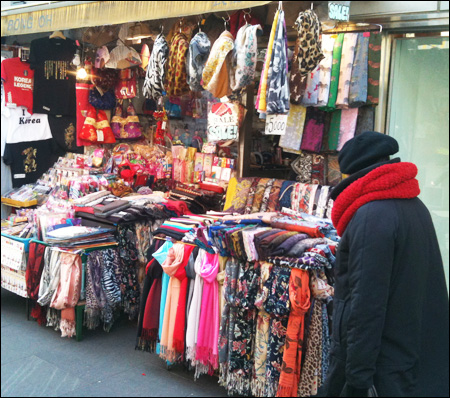Made-in-China goods face ban at Insa-dong

A souvenir shop in Insa-dong, central Seoul, Monday. Jongno Office and Seoul City are seeking to ban the sales of products made in China or Southeast Asia out of concern that low-quality items from the countries tarnish the cultural image of the street
Seoul City and Jongno Office are moving to drive made-in-China products out of Insa-dong under concerns that low-quality foreign products tarnish the image of the tourist district famous for traditional Korean craftworks and other cultural items.
But the plan is drawing a backlash from merchants there. It is also possible that it contradicts related laws.
According to the Jongno Office, it has asked the Seoul City to revise an ordinance for Insa-dong, the city-designated special cultural district, to remove foreign-made products from the area.
Under the ordinance, the city can ban the operation of businesses that may spoil the purpose of the cultural district designation. The ward office said it will seek to add a new clause to the ordinance so that only made-in-Korea merchandise can be sold within the tourist area.
“We see most of the items at souvenir shops are made in China or Southeast Asian nations, and we worry foreign visitors may mistake the low-quality ones as Korean products. Insa-dong is a thoroughfare of tradition, so products there should fall under this concept,” said a ward office official.
The official said he understands why merchants sell made-in-China items — they need to earn a larger margin with the low-cost products, because the monthly rent of the shops ranges from 5 to 30 million won as Insa-dong becomes more famous and attracts 70,000 to 100,000 daily visitors on weekends or holidays.
“The dominance of foreign-made products is against the purpose of designating Insa-dong as a zone of traditional culture. Such items threaten Insa-dong’s identity,” he said.
He said the ward office’s lawyers concluded it may be legally fine to promote sales of only homemade products there to enhance the district’s image of craftsmanship. “We are discussing it with the city government and the Ministry of Culture, Sports and Tourism.”
But the city government was more cautious about defining the new clause.
“Even though Insa-dong is a special cultural zone, the clause may contradict the law on free trade. Culture-related laws also don’t have detailed rules on such cases. So, we need an authoritative interpretation from related ministries before revising the ordinance,” city official Kim Hoon-ki said.
Kim said another issue is the reaction from merchants there. “Whether or not they will agree to the idea is the most important. But we expect they will oppose the plan because it will directly affect their livelihood,” he said.
The merchants, as Kim expected, were not happy.
“It is nonsense. Will the city government pay my rent?” said Han, a worker at souvenir shop Eolssigu Madang. “It is true that shops here sell products from China. But shop owners go to China, make the products with Chinese workers and bring them back to Korea, so we can’t say they are really ‘made-in-China,’” Han said, adding they cannot make ends meet solely with domestic products.
Park Won-chul, who runs Jin Moon Picture Gallery but sells souvenirs as well, said about 50 percent of his products are made-in-China. “Foreigners all know the items are from China. But they still buy such products because they are cheap. They don’t buy the expensive items,” the 64-year-old said.
No more cosmetics shops?
Along with the foreign product ban, the ward office seeks to close businesses that may damage Insa-dong’s image, including cram schools, telecommunication agencies, and cosmetics, shoes or bakery chains.
“Since the ordinance was drawn up in 2002, it has banned the operation of 16 businesses unrelated to tradition, such as video rental, karaoke bars, and barber shops, on the main street. With time passing, new businesses also unrelated to tradition emerged and settled in Insa-dong, so we need to revise the ordinance to include the new ones,” the ward office official said.
He also said the related law doesn’t empower the ward office to crack down on such businesses even though they don’t follow the ordinance, adding the law should be changed so that the office can impose fines on them.
Tourists generally consented to the idea. “Seoul has changed a lot since my last visit 20 years ago. But Insa-dong still has the traditional image and I hope it can retain it. Insa-dong doesn’t need to have cosmetic brand shops because if we want to buy such products, we can go to Myeong-dong or Sinchon,” Yoshihiro Watanabe, a Japanese traveler, said. <Korea Times/Kim Rahn>

























































